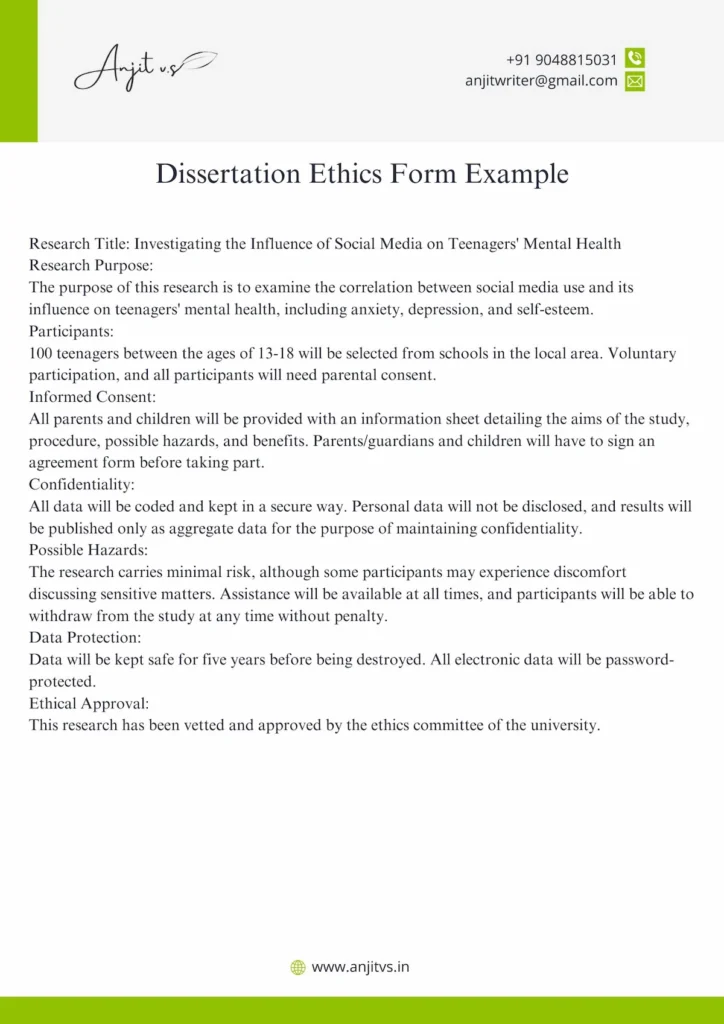Are you wondering why you’re stuck on the ethics form for your dissertation? Having trouble deciding what goes into it or how to complete it correctly? This blog explores all you need—dissertation ethics form tips, examples, and step-by-step instructions to assist you in getting it correct!
What is an Ethics Form for Dissertation?
A dissertation ethics form is a document that states how you intend to carry out your research in an ethical and responsible manner. It makes sure that your study is up to ethical standards, particularly when human participants are involved. A dissertation ethics form contains information such as consent, confidentiality, and risks. Reading an example of dissertation ethics form can give you an idea of what is expected and how to fill out your own ethics form for dissertation correctly.
Dissertation Ethics Form – Importance and Purpose
Knowing the significance and use of a dissertation ethics form is vital in responsible research. Here’s why:

Guarantees Ethical Standards:
The dissertation ethics form ensures that your research complies with ethical standards and university policies.
Protects Participants:
It ensures the rights, privacy, and welfare of human participants in your study are protected.
Identifies Potential Risks:
A dissertation ethics form identifies and manages any risks in your research methodology.
Encourages Transparency:
It encourages open and transparent research by announcing conflicts of interest and data management practices.
Approval Requirement:
Filling out the ethics form is frequently a prerequisite to commencing data collection.
Clarifies Research Purpose:
Going through a dissertation ethics form example or ethics form dissertation example makes your research goals clearly understood regarding responsible conduct.
By reading through an ethics form for dissertation example, you will be sure to submit in adherence to all expectations.
Key Components of a Dissertation Ethics Form
A dissertation ethics form generally consists of research aims, participant information, consent process, data protection practices, and risk evaluation. Examining an example of ethics form for dissertation gives you an idea of how to organize and present these critical elements in an effective manner.
Read More:
| Dissertation Topics | MBA Dissertation Topics | Nursing Dissertation Topics |
| Law Dissertation Topics | History Dissertation Topics | Psychology Dissertation Topics |
How to Write an Ethics Form for Dissertation?
Define Your Research Purpose:
Clearly explain your study’s aim and objectives using a dissertation ethics form example as a guide.
Identify Participants:
Describe who will participate and how they will be selected, referring to an ethics form dissertation example.
Outline Consent Process:
Explain how you’ll obtain informed consent, ensuring clarity and transparency.
Address Data Protection:
Specify how participant data will be stored, held confidential, and ultimately disposed of in a secure manner.
Highlight Potential Risks:
Utilize an ethics form for dissertation example to identify and describe any potential risks and how they’ll be addressed.
Dissertation Ethics Form Example
A sample of a dissertation ethics form provides a clear guide for knowing how to present your submission. Examining an ethics form example for dissertation ensures your research is up to standard in ethics and does not have common pitfalls when being approved.

Tips To Submit Your Ethics Form for Dissertation
Review Carefully:
Make sure that your ethics form for dissertation is accurate, comprehensive, and representative of your research’s ethical standards. Take a dissertation ethics form example as a guide in order to not leave out important elements.
Seek Feedback:
Have your advisor or peers review your ethics form dissertation example prior to submission. They can help enhance clarity and resolve possible issues.
Be Clear and Transparent:
Define your research aims, participant engagement, and data processing steps clearly. Transparency is essential for securing ethical approval.
Comply with Institutional Guidelines:
Make sure your form aligns with the particular guidelines given by your institution or ethics committee. This can involve style and paperwork requirements.
Send Early Enough:
Ethics approvals are not instantaneous, so send your form early enough before your data collection date to prevent slowing down your dissertation timeline.
Include Mandatory Documentation:
Submit any other documents, like consent forms, participant information sheets, or risk assessment plans, if required in the ethics form dissertation example
Following these guidelines, you can submit your dissertation ethics form confidently and proceed with your research.
Read More:
| Conceptual Framework | How to Write Dissertation Introduction | Dissertation Proposal |
| Dissertation Abstract | How To Write A Dissertation | Dissertation Conclusion |
How Seeking Professional Help For Writing Dissertation Ethics Form Help you
Hiring professional assistance in writing your ethics form for dissertation can go a long way towards simplifying the process. Professionals like Anjit VS can assist you in writing a concise and detailed form that satisfies ethical requirements. Our expert writers can assist you in making your ethics form for dissertation accurate, detailed, and conforming to university regulations. Going through examples of dissertation ethics forms or ethics form dissertation samples with their assistance can make your submission flawless, accelerating approval and enabling you to concentrate on your research.
| Dissertation Writing Tools | Finance Dissertation Topics |
| Top 5 Dissertation Writing Websites in Canada | Top 5 Dissertation Writing Companies in UK |
Conclusion
Thank you for taking the time to read this guide! We hope it has been useful in giving you useful insights on how to write a detailed and effective dissertation ethics form. Does this blog make you feel more confident writing your dissertation ethics form? We’d love to hear what you think and any feedback you have to make this content better. Feel free to leave your experiences or questions in the comments below!
Frequently Asked Question (FAQ)
Why am I required to fill out an ethics form on my dissertation?
An ethics form guarantees that your research complies with ethical requirements, respects the rights of participants, and complies with institutional regulations, which is a necessity for getting approval and performing accountable, trustworthy scholarly research.
What happens if my ethics form gets rejected?
If your ethics form is not approved, you cannot start your research. You’ll have to revise and resubmit it based on feedback, which can push back your overall dissertation timeline.
Is it acceptable to start research without approval of the ethics form?
No, you have to wait until your ethics form is approved. Starting early can result in academic sanctions or rejection of your research findings by your institution.
Should I still submit an ethics form if my study doesn’t involve people?
Yes, even if your research doesn’t involve human participants, you need to fill out an ethics form in order to ensure that no ethical concerns exist within your methodology or data collection process.

